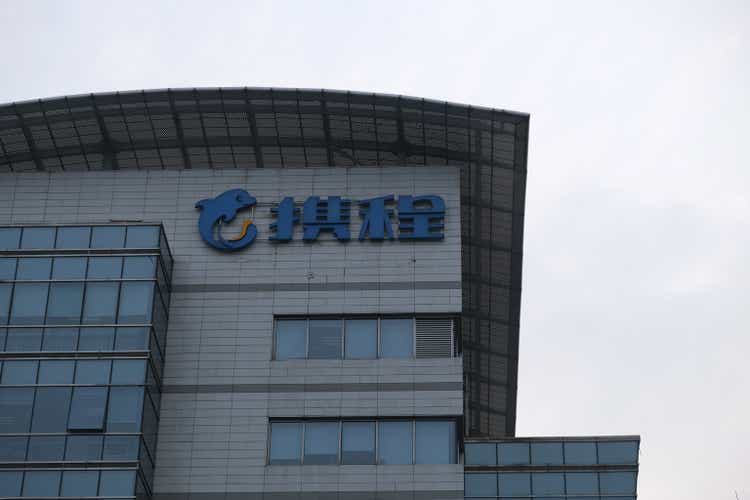
Robert Way/iStock Editorial via Getty Images
Elevator Pitch
I have a Hold investment rating assigned to Trip.com’s (NASDAQ:TCOM) [9961:HK] stock.
There shouldn’t be any negative surprises relating to TCOM’s Q2 2022 results announcement next week, and Trip.com seems undervalued based on the P/E metric (using pre-pandemic earnings as a proxy for normalized future profits). However, I will want to wait for signs of China relaxing its COVID-19 restrictions before turning bullish on TCOM. As such, Trip.com is a Hold rather than a Buy for me at the moment.
Company Description
Trip.com describes itself as “a Chinese multinational online travel company” in its media releases. TCOM completed its secondary listing on the Hong Kong Stock Exchange in April 2021; the company’s (previously known as Ctrip) shares were first listed on Nasdaq in December 2003.
In 2019 prior to the pandemic outbreak, TCOM generated 39% and 38% of its top line from transportation ticketing and accommodation reservation, respectively, according to its fiscal 2019 20-F filing. Packaged tours, corporate travel, and other businesses (such as online advertising) accounted for the remaining 13%, 4% and 6% of Trip.com’s pre-COVID FY 2019 revenue, respectively.
Recent Industry Data Was Disappointing
China’s Ministry of Culture and Tourism recently released data relating to tourism for the Mid-Autumn holiday which occurred between September 10 and September 12, 2022.
The number of domestic tourists for this year’s Mid-Autumn holiday in China was approximately 73.4 million. Based on my calculations, this figure is still -27% below the pre-pandemic domestic tourist number in 2019 before the COVID-19 outbreak. Even if I do a year-on-year comparison, domestic tourists for China’s Mid-Autumn holiday have still declined by -17% in 2022 vis-a-vis 2021.
The numbers still don’t look good, if I compare China’s 2022 Mid-Autumn holiday tourism statistics with the other major holidays in the country that happened earlier this year. For the Labor Day holiday which took place in the April 30 to May 4, 2022 period, the domestic tourist visits per day was around 32 million. Daily domestic tourists amounted to roughly 27 million for the Duanwu Festival holiday that fell in the June 3-5 2022 period. In contrast, the mean number of domestic tourist for this year’s Mid-Autumn holiday was notably lower at 25 million.
Prior to the Mid-Autumn holiday this year, “the (Chinese) government had urged residents to curb travel to avoid Covid outbreaks from spreading” as highlighted by Bloomberg, and this clearly had a negative impact on domestic travel in China during this 3-day holiday for the September 10-12 period.
Q2 2022 Financial Results Preview
TCOM is scheduled to disclose the company’s Q2 2022 financial performance next week on September 21, 2022.
Trip.com should have performed poorly in the second quarter of this year, as this coincided with the worst of COVID-19 lockdowns in Mainland China. As an indication of how bad things were in the recent quarter, the 0.4% GDP growth for China in Q2 2022 was the second worst in the country’s history, and this was largely attributable to lockdowns and other restrictions put in place to fight the pandemic.
According to the market’s consensus financial estimates sourced from S&P Capital IQ, Trip.com’s top line and normalized profit are forecasted to have decreased by -39% YoY and -87% YoY to RMB3,582 million and RMB93 million, respectively in Q2 2022.
The sell-side’s consensus numbers for TCOM are aligned with the company management’s disclosures at the prior quarterly earnings call. At its Q1 2022 results briefing on June 28, 2022, TCOM shared that “in the (second) quarter-to-date, the industry level air passenger volume (in China) was down by 70% to 90%.”
In a nutshell, Trip.com’s Q2 2022 results are very likely to be bad, but this has already been factored into the analysts’ financial estimates. As such, I am of the view that TCOM’s second-quarter results released next week will be in line with the market’s expectations, implying no significant beat or miss.
Travel Recovery Play In The Intermediate To Long Term
The short-term business outlook for TCOM remains unexciting, as there aren’t any clear signs that China will abandon its COVID-zero stance anytime soon.
Bloomberg reported on September 9, 2022 that China’s “National Health Commission” had “announced a raft of (COVID-19) measures that will be in place until the end of next month (October).” The current consensus is that China will only be ready to pivot away from its COVID-zero strategy when domestic mRNA (Messenger RNA) vaccines are approved and available in China.
On the flip side, Trip.com appears to be an attractive travel recovery in the medium to long term.
A February 2019 report published by McKinsey referred to TCOM as “China’s largest online travel agency”, and highlighted that China is “the world’s largest outbound-travel market.” Any indications in the future suggesting that China plans to relax pandemic restrictions will be a major re-rating catalyst for the stock. In terms of a potential time frame for this investment idea, the sell-side’s consensus financial projections as per S&P Capital IQ point to Trip.com’s revenue exceeding its pre-COVID sales of RMB35.7 billion for the first time by 2024.
More significantly, Trip.com’s shares have yet to price in the future easing of COVID-19 restrictions and resulting recovery in travel. Based on its done share price of $25.94 as of September 14, 2022, TCOM is now valued by the market at 17.0 times pre-pandemic fiscal 2019 P/E. As a comparison, Trip.com traded at a mean forward P/E of around 28 times in the one year prior to the COVID-19 outbreak.
Concluding Thoughts
Trip.com is a Hold-rated stock in my view. TCOM’s P/E valuations are undemanding, based on the assumption of an eventual recovery to pre-pandemic net profit levels. But it is premature to be bullish on Trip.com’s shares, as there aren’t any indicators suggesting that a change in China’s COVID-zero policy is going to happen soon.


Be the first to comment